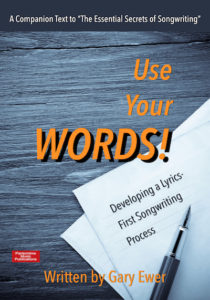I read an interview with Paul McCartney once where he talked about the choice of words in “She Loves You.” In particular, he and Lennon considered it a bit risky to be singing a song about “he” and “you”, since most love songs put the singer front and centre.
In other words, musical logic dictates that you’d want to sing, “She loves me” rather than “She loves you,” if only because it makes it easier for listeners to put themselves in the place of the singer.
 Are you ready to have LYRICS take a much more important role in your songwriting process. You need to read “Use Your Words! Developing a Lyrics-First Songwriting Process.” Right now, it’s FREE with your purchase of “The Essential Secrets of Songwriting 10-eBook Bundle”
Are you ready to have LYRICS take a much more important role in your songwriting process. You need to read “Use Your Words! Developing a Lyrics-First Songwriting Process.” Right now, it’s FREE with your purchase of “The Essential Secrets of Songwriting 10-eBook Bundle”
Of course,”She loves you” works brilliantly, shifting the focus so that it’s a song where the singer is advising a friend, rather than a song about the singer.
But most of the time, a good love song lyric will describe a situation between the singer and some particular love interest. When it’s a song about love gone wrong or a love that’s not working, the temptation might be to sing about how you feel about the situation.
But that might lead to self-centred lines of the “I feel so lousy” variety, and those ones rarely work out. Why? Because it makes your song sound like 4 minutes of whining and complaining about your situation. That rarely makes the connection to listeners you’re hoping for.
Getting the balance right is tricky. Eighties power ballads usually got it right if you want examples of how to word things. In Chicago’s “Hard Habit to Break” (Steve Kipner, John Lewis Parker), the chorus describes situations that create emotions, and that’s the key:
Now being without you
Takes a lot of getting used to
Should learn to live with it
But I don’t want to
Being without you
Is all a big mistake
Instead of getting easier
It’s the hardest thing to take
I’m addicted to ya babe
You’re a hard habit to break
There’s no “I feel lousy” kinds of lines; every line is written to create an emotion, not describe one. There’s nothing wrong with describing an emotion from time to time, though it works a lot better when the emotion is a positive one (“…because I’m happy…” – Pharrell Williams)
This is probably why love songs still sell, and we still love to hear new ones. The emotion is as old as the hills; it’s the situations and circumstances described in the songs are usually (hopefully) somewhat different.
And every successful lyric of the hurtin’ song variety avoids putting the focus on the feelings and emotions of the singer, and focuses instead on things that create emotions. You need to do the same.
 Written by Gary Ewer. Follow Gary on Twitter.
Written by Gary Ewer. Follow Gary on Twitter.
 “The Essential Secrets of Songwriting” eBook bundle includes“Writing a Song From a Chord Progression”. Discover the secrets of making the chords-first songwriting process work for you.
“The Essential Secrets of Songwriting” eBook bundle includes“Writing a Song From a Chord Progression”. Discover the secrets of making the chords-first songwriting process work for you.










